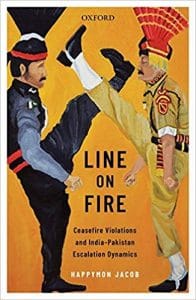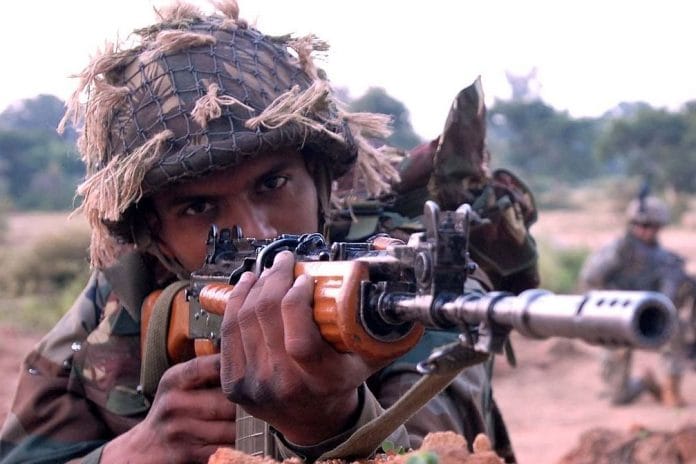If I have commanded a battalion there and have done a lot of fire exchange with the other side as a part of psychological dominance, the officer who replaces me will inherit that confrontation … and that goes on. —Col Ajai Shukla (Retd)
Personal and regimental honour are the lifeblood of soldiery around the world; Indian and Pakistani militaries are no different. Izzat (or honour) is a powerful tool for motivation, which leads men in arms to kill and to get in harm’s way without any hesitation or asking any questions, at a mere nod of their COs. This unique feeling of comradery, fraternity, and discipline can also, however, cause more violence. Responding in kind to the aggression or an attack by the other side is seen as an important element in this hyper-nationalist cosmology. As a senior Pakistani general put it, ‘After Indians kill one of our men, it becomes a matter of honour for Pakistanis to respond in kind’. In situations of that kind, which every commander knows will occur from time to time, honour and strategy make a deadly combination. And the other side knows that there will be no let-up till one retaliatory kill is made.
Honour goes beyond mere revenge for the fallen men on one’s side [of the line of control]—it is also about the prestige and history of the regiment, handed down through generations and held sacrosanct. While the blood of the dead should be avenged, the honour of the living needs to be preserved as well. Those who have a reputation of being brave must continue that tradition, others will have to earn it—either way, the result is aggression and blood feuds.
Gen. Panag explains how it works in real life on the front lines using an appropriate example. Every regiment, he says, has an honorary colonel, a patriarch of some kind. One day, suddenly he would read in the newspapers that 13 Rajputana Rifles, for instance, has had an incident and suffered casualties. He, stationed somewhere else, would call up the CO and say, ‘Bezzati ho gayi ’, that the regiment has been shamed and now the CO must do something. This will then become a matter of ‘safekeeping’ the regimental prestige and honour for the CO who would be psychologically compelled to act, to take revenge. A failure to do so would not only be a personal setback for the CO but also a collective shame for the regiment. And shame is not something a soldier can live with.
Gen. Ghazi of the Pakistan Army gives a similar example from the time he was posted as the CO on the LoC in 1990: When I went to take command in the area opposite Poonch sector, the orders were in place to curb unnecessary firing by our troops. Earlier, due to some construction activities undertaken by our side, the Indians had blasted our posts with big-calibre anti-aircraft guns and three guys were killed on our side. The LoC had been very live as a result and the divisional commander (GOC) felt that needless provocations had to stop. My predecessor had issued orders not to fire even a single bullet without his personal permission, even if the other side was firing. The morale of the unit plummeted. The CO was removed and I was posted in his place.
When I arrived to take command, I found some troops from the unit standing on the road, blocking my way. They were all Northern Light Infantry (NLI) troops who had a different sense of loyalty and were far more independent-minded than others. When I got out of the jeep, I was told that I wouldn’t be allowed to proceed to my HQ until the problem of ‘murdaar maut’—a humiliating death— was sorted out. I was taken aback by what some may see as mutinous behaviour but I realized that they were right. The other side was firing and these guys had to duck down and keep quiet on the orders of their officers! They were really riled up. So, I asked them to load the nearest weapon they had, identify the target, and fire to their heart’s content. Around five or six men fired for a long time. It uplifted the morale of the battalion immediately and we bonded in a mutual affection that survives to this day. It is another matter that I had hell to pay before my GOC that day for initiating a major CFV on my first day in command! There is also the element of a regiment’s history preceding its induction in a particular area.
Also read: Politicise all you want, but Indian soldiers don’t fight in the name of nationalism alone
The adversary on the other side of the newly inducted sector/area would come to know about the reputation of the incoming unit/battalion and this may trigger a certain behaviour on the other side. As Gen. Panag says, ‘each unit has its own reputation, which is known to both sides. Within the army, the individual commanders are chosen for the job depending upon the unit’s characteristics, its performance, and its value systems that are assigned to it.’ He recalls the reputation of the 4 Sikh regiment when he was part of it and was sent to the LoC in 1968: ‘In 1968, when my unit, 4 Sikh, went to a sector that witnessed sporadic firing, our CO sent a message to the other side that “ jo ho gaya, so ho gaya ab 4 Sikh aa gayee hai ” [“what is done is done, now 4 Sikh (Indian Army unit) has arrived”]. So now if you guys do any mischief, you are going to have it.’
This had a calming effect in the area. Put differently, aggressive regiments often lend peace to an area. Sometimes, certain locations have a history of aggressive deployment, patrolling, and violence, which tends to be handed down to the new incoming units, which stick to the behaviour patterns of their predecessors. Col Shukla explains it: ‘If I have commanded a battalion there and have done a lot of fire exchange with the other side as part of psychological dominance, the officer who replaces me will inherit that confrontation … and that goes on.’
The contours of such military subcultures and their implications should be carefully analysed to understand how and why certain areas report more violence, and sometimes calm.
 This excerpt from Ceasefire Violations and India–Pakistan Escalation Dynamics by Happymon Jacob has been published with permission from Oxford University Press.
This excerpt from Ceasefire Violations and India–Pakistan Escalation Dynamics by Happymon Jacob has been published with permission from Oxford University Press.







Mr Jacob just to remind u that Pakistan resorted to heavy firing when our troops constructed fencing towards own side to deter infiltration. Paki army is well known to give an upper hand to their NCOs and JCOs as far as firing on our position and troops are concerned. IA on the other hand has been a disciplined and professional army and does not simply get carried away in emotions. The writer has also very tactfully missed out on the covering fire provided by Pak army to the terrorists getting into our territory and thus retaliatory fire carried out by own troops to deter the same. It seems Mr Jacob has heard these stories in some Pakistan chaikhana or a bar.
Itna pakistani ki oisvade mein kyo ghuste ho bhai?
The author is long known in intelligence circles for being a Chinese overground worker. He has zero credibility.
Mr Jacob do you feel problem at LOC shorted out or at larger view one can say issue of valley will be shorted out if Indian will accept all demands of Pak. I donot think so certainly their next plan may be Punjab or Gujrat or so on. We are democratic and guided by democratic institutions not like our neighbouhoods where narratives were generated on regular basis.
Today Pak seeks ceasfire not because they are seeking peace but buying the time. Ducking the bullet was the policy of India due its democratic structure not policy of Pak.
Eventhough we are followers of Gandhi but donot forget Bose. I strongly feel these policies now getting good results and it is not a matter of izzat it is matter if stragic reply to Pak.
It seems Mr. Jacob either to be biased or has cowardice elements in his blood. What do you do when some thieves enter in your house, start looting your possessions, harm your close ones or even rape your women? I am sure nobody would sit peacefully and watch the drama. People like Mr. Jacob are highly intellectuals and great influencers. Without knowing the ground reality they keep working to spread someone else’s propagenda with or without personal benefits, just because they like to be in limelight when they have been shown backdoors. Unfortunately, we have many such people in this country whose contributions are only to halt the progress made by our governments and forces.
When you talk about Izzat, self respect and other stuff related to Armed forces, please try to speak to non political REAL army officers for views. For any article if you quote highly opinionated, biased, politically motivated middlemen , it reduces the credibility of your research.
My comments shall be restricted to this article and not the book.
The one up man ship being shown and talked is just a mindset of senior officers. I do not consider such a thing is essential for morale of the troops. Being a professional army our aim when on LOC should be the security of our borders and not how much we fire on enemy. Troops can be motivated by several other ways.
eg. A CO can also motivate his troops by practising the principle of “minimum firing yet maintaining zero infiltration” . It may propound a different look of a well trained battalion.
Look at CRPF deployed in valley. For years they have been restrained from opening up their weapons on general public even at the cost of humiliation, at very times. Yet their senior officers and COs have turned the force into a motivated outfit over the period and they are doing a commendable job.
We should be skeptical of JNU Professor, Happymon Jacob, as he is a leading proponents of Chinese interests. He also ends up on the Pakistani side in his writings. He even got special access from the Pakistani army during his research. The root cause of clashes between India and Pakistani on the LOC are the terrorist camps that serve to infiltrate terrorists. However, Mr Jacob’s analysis consistently ignores this root cause. So, inevitably, he suggests that India and Pakistan should stop firing. This is similar to saying that India and Pakistan should engage in peace talks – something that Mr Jacob supports as well. How does that help solve the terrorist problem? By ignoring and downplaying India’s primary concerns, Mr Jacob provides sophisticated and subtle support for Pakistani agenda.